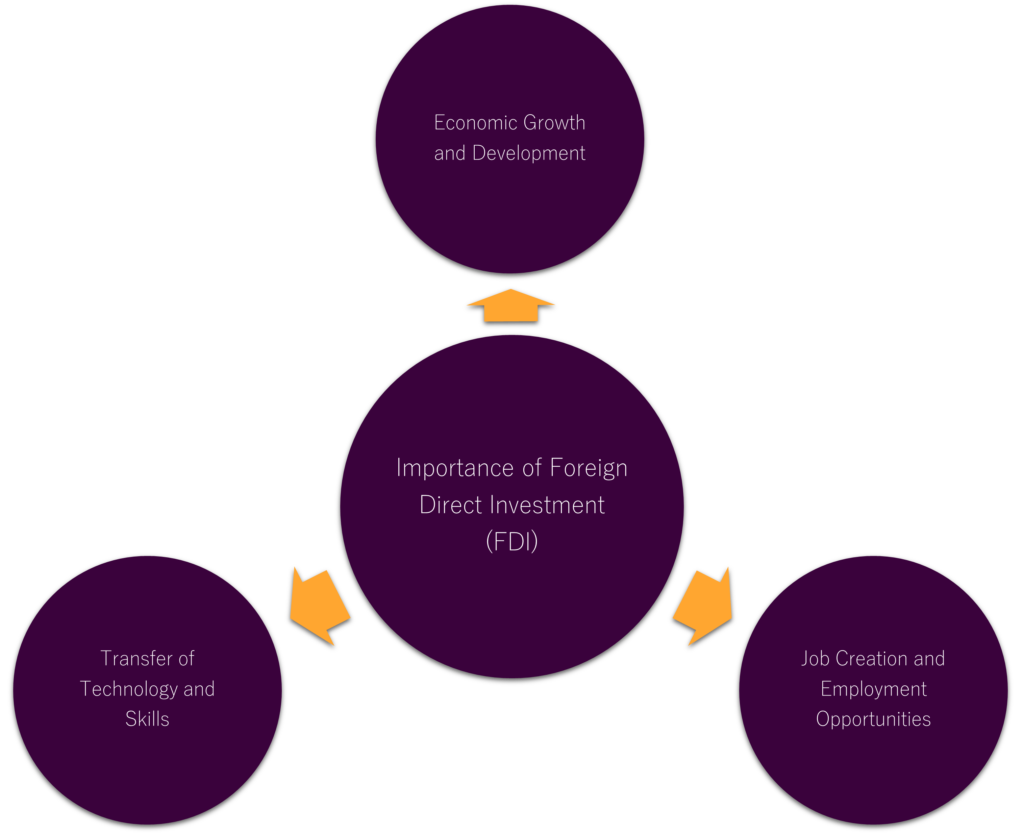In the year 2022, the global economy experienced an unprecedented influx of $1.28 trillion through foreign direct investments (FDI). This figure underscores the increasing role of Foreign Direct Investment in reshaping the world’s economic map. Hence, exploring the nature of FDI unveils its pivotal position within international economic strategies and global trade dynamics.
This endeavour allows multinational entities, investors, and governments to extend their influence into foreign territories. Through such strategic alliances, these bodies further acquire direct influence over the operational and strategic aspects of a foreign entity. Such engagements also delineate FDI from mere financial diversification strategies, highlighting its proactive and involved nature.
The strategic, economic, and developmental implications of FDI are profound. By infusing capital into foreign markets, FDI also functions as a catalytic force for economic revitalization and innovation. It fuels job creation, income growth, and knowledge dissemination, thus, accelerating economic progress and communal welfare.
Embedded within the framework of international business, FDI affords various advantages to both investors and their host nations. Companies benefit from enhanced market reach, fiscal advantages, and operational cost reductions. Conversely, host countries exploit FDI to bolster economic structures, enhance technical expertise, and foster the growth of their labour force.
As globalization deepens its roots, FDI assumes a critical position in the agendas of business leaders and government policymakers. Grasping the core tenets of FDI – its definition, criticality, and benefits – is vital for effective global economic engagement. Therefore, it serves as a cornerstone for navigating the intricacies of today’s interconnected business environment.
Econometrics Tutorials with Certificates
What is Foreign Direct Investment (FDI)?
Defining foreign direct investment poses a complex and nuanced endeavour. It implicates an investor, entity, or government from one country acquiring a substantial share of a company or project in another. This involvement is distinguished from passive investment strategies by its active, management-oriented approach.
Definition of Foreign Direct Investment
Foreign direct investment (FDI) constitutes an equity holding in a company or project located abroad, carried out by an entity or government from a different nation. When scrutinized further, a foreign investment earns the label of FDI if it secures a tangible interest, defined by a minimum of 10% of a firm’s voting shares. This categorization underscores the essential role of significant ownership or influence. The final reference stipulates that FDI materializes when an entity takes authoritative control over another firm or entity in a foreign land.
Key Characteristics of Foreign Direct Investment
The essence of FDI involves “establishing effective control or a substantial role in the decision-making of international business entities.” It emphasizes the proactive management and influence exerted over the operations of international ventures, further highlighting a clear distinction from passive foreign investment strategies.
Difference between Foreign Direct Investment and Foreign Portfolio Investment
Foreign portfolio investment signifies the incorporation of global assets into the investment portfolio of a corporation, institutional entity, or individual investor. It achieves diversification by acquiring the equity or debt securities of international entities. Conversely, foreign direct investment pertains to a significant and direct capital outlay in or the complete purchase of a foreign-based enterprise, requiring more substantial involvement than the acquisition of their financial instruments alone. For emerging economies, FDI can constitute a significant fraction of their total economic output. This source contrasts FPI, which deals with the ownership of an entity’s securities rather than a direct engagement with the institutional framework through capital expenditure.
Importance of Foreign Direct Investment
Foreign direct investment (FDI) is also instrumental in propelling economic growth and developmental initiatives worldwide. The interaction between investing entities and host nations initiates a ripple effect. This effect further includes the enhancement of a target country’s economic fabric, the cultivation of a welcoming arena for business entities, and the invigoration of local markets and communities through FDI. Such insights underscore the pivotal role FDI plays in creating an environment beneficial for national and international commerce.

Economic Growth and Development
The unceasing influx of FDI into host nations significantly accelerates their economic growth and development. With capital, technology, and know-how from foreign entities, economies experience a surge in technological innovation and productivity. The transformative role of FDI’s impact on economies is pivotal. As a result, FDI can have a significant impact on a nation’s economic architecture.
Job Creation and Employment Opportunities
FDI’s ability to forge new job opportunities and bolster employment rates is a cornerstone of its impact. Investments in new corporate ventures abroad not only spur job creation but also augment the earning power and purchasing ability of locals. This, in effect, catalyzes broad economic growth. The impetus FDI provides in the establishment of enterprises, and factories, and the proliferation of subsidiary operations creates an extensive scope for employment, thus benefiting the indigenous workforce.
Transfer of Technology and Skills
Moreover, FDI serves as a conduit for the dissemination of technological, intellectual, and skill-oriented resources across nations. The very essence of foreign direct investment underscores its role in fostering knowledge, technological, and skill exchanges. This process not only enriches the recipient country’s technological infrastructure but also enhances its global competitiveness. The import of skills and know-how facilitated by FDI contributes significantly to the technological prowess and expertise of the host country, thereby fortifying its competitive edge and fostering long-run economic growth.
Methods of Foreign Direct Investment
Foreign direct investment (FDI) manifests through diverse methods, each method presenting distinct benefits and strategic avenues for firms aspiring for further expansion.
Mergers and Acquisitions
FDI pathways include mergers and acquisitions, pivotal when a company aims to procure a majority share in an external enterprise. This strategy bestows immediate access to the target company’s assets, market share, and established operations. As an illustration, the U.S. company Nvidia affirmed a $40 billion procurement of ARM, a U.K.-based chip designer, in 2020. However, the transaction was nullified in 2022 due to concerns that it would harm the competition.
Joint Ventures and Strategic Alliances
Another avenue for FDI is the facilitation through joint ventures and strategic alliances with overseas entities. These collaborations facilitate the sharing of risks, the amalgamation of resources, and the exploitation of collective strengths. They are instrumental in penetrating novel markets and also spearheading the innovation of products and services.
Greenfield Investments
The third technique is the inception of a new entity, wholly owned or in partnership, known as a greenfield investment. Therefore, this mode essentially involves initiating operations from scratch, allowing the investing entity to configure the endeavour according to its precise prerequisites and ethos.
Benefits of Foreign Direct Investment to the Investors
Foreign direct investment (FDI) yields substantial benefits for entities engaging in foreign ventures and the recipient locales.
Access to New Markets and Global Expansion
The principal value of FDI is it also allows access to untapped markets and the potential for planet-wide growth. Through investing in foreign territories, companies augment their operational breadth, engage with fresh clientele, and hence, seize growth prospects within diverse geographic zones.
Cost Savings and Increased Efficiency
Furthermore, FDI is instrumental in driving substantial savings and efficiency enhancements within the investing firm. FDI can also result in “cost reductions” and “heightened productivity” for the investor. This is commonly achieved via leveraging reduced labour expenses, the advantages of scale, and the utilization of exclusive resources and infrastructure available in the host nation.
Tax Incentives and Subsidies
Furthermore, the availability of tax breaks and financial grants provided by recipient countries to entice overseas investors stands as a significant advantage of FDI. Such perks can markedly enhance the financial returns and sustainability of FDI endeavours.
Foreign Direct Investment: Trends and Statistics
Top Recipient Countries for Foreign Direct Investment (FDI)
The United States claimed the top spot for FDI destinations globally in 2022, a position secured by China in the second place. Further down, Brazil, Australia, and Canada consolidated the list’s notable figures.
Key Statistics: Foreign Direct Investment
China’s economic surge has been markedly influenced by increasing FDI inflows. Moreover, their aspiration to upgrade their tech-oriented manufacturing and service sectors involved a significant FDI boost.
For detailed statistics on the trends of FDI in India, you can take a look at the post on Foreign Direct Investment in India.
| Key FDI Statistics | Value |
|---|---|
| Total foreign direct investment expenditures in the U.S. for 2022 | $177.5 billion |
| Decrease in FDI expenditures compared to 2021 | 51% |
| Portion of total expenditures represented by acquisitions of existing businesses | $169.4 billion |
| Share of total FDI expenditures in the manufacturing sector | 31.1% |
| FDI expenditures by Canada, the largest investing country in the U.S. in 2022 | $37.9 billion |
| FDI expenditures in California, the state receiving the highest investment | $29.0 billion |
| Greenfield investment expenditures in the U.S. in 2022 | $8.1 billion |
| Employment at newly acquired, established, or expanded foreign-owned businesses in the U.S. in 2022 | 142,700 employees |
| FDI inflows as a percentage of GDP in 2022 for China and the U.S. | 1.0% and 1.5% respectively |
| FDI as a percentage of GDP in 2022 for the Cayman Islands and Hong Kong | 359.2% and 33.6% respectively |
| Global foreign direct investment in 2020 and 2021 | $859 billion and $1.5 trillion respectively |
| FDI attracted by China and the U.S. in 2020 | $163 billion and $134 billion respectively |
Challenges and Risks of Foreign Direct Investment
Foreign direct investment (FDI) presents significant benefits and risks for both investors and host nations. A critical concern is the exposure to political and economic turmoil. The regulatory environment can also vary considerably across multiple nations, leading to heightened political risk. Instances of sudden policy shifts, state instability, or financial downturns can gravely impact an FDI’s viability and the overseas company’s endeavours.
Overcoming political and economic challenges is complex enough, but FDI also encounters the obstacle of cultural disparities and linguistic divisions. Navigating a new environment’s customs, norms, and communication can further pose formidable challenges. These issues, alongside potential misunderstandings and integration difficulties within the local labour pool, can also substantially hinder FDI’s success. It is important to note that existing knowledge does not fully explore cultural and linguistic challenges in the context of FDI.
| Challenge | Impact | Mitigation Strategies |
|---|---|---|
| Political and Economic Instability | Sudden changes in government policies Political turmoil Economic crises Heightened regulatory oversight | Thorough risk assessment Diversification of investment portfolio Collaboration with local partners Monitoring of political and economic trends |
| Cultural Differences and Language Barriers | Misunderstandings in communication Difficulty in integrating with the local workforce Challenges in adapting to local customs and norms | Culturally sensitive training for employees Hiring of local talent with cultural expertise Investing in language education and translation services Establishing clear communication protocols |
Addressing these multifaceted challenges is key to increasing the success odds of FDIs and reducing the associated risks when venturing into foreign markets.
Impact of Foreign Direct Investment on Host Countries
The influence of foreign direct investment (FDI) on nations hosting such ventures is extensive, touching upon economic, technological, and societal realms simultaneously.
Economic Growth and Development
Foreign direct investment (FDI) acts as a catalyst for a country’s economic progression, fostering an environment conducive to corporate endeavours, investor engagements, and communal advancement. Notably, Jenkins and Thomas (2002) reveal that fifty per cent of all incoming capital directly augments domestic investments in developing realms.
This statistic emphasizes the significant role played by FDI in amplifying local economies. Additionally, the works of Bosworth and Collins (1999) underscore that each dollar infused through FDI generates a fifty-cent surge in local investments within developing spheres.
Technology Transfer and Knowledge Spillovers
FDI paves the way for the transfer of essential resources and the sharing of indispensable knowledge, technical expertise, and competencies. The substantial contribution of technology transfers through FDI, hence, leads to heightened productivity and economic uplift of host nations.
Lall and Streeten (1977) also accentuate the strategic managerial advantages yielded by FDI investments. They encompass enhanced managerial proficiency, advanced entrepreneurial prowess, and the spillover benefits of workforce development. These insights further underscore the multifaceted benefits of engaging with FDI from a developmental standpoint.
Environmental and Social Considerations
Notwithstanding its economic benefits, FDI’s entrance introduces critical environmental and social challenges to host regions. Additionally, the operations of MNCs often create concerns related to their negative environmental impact through pollution. Crafting informed policies and establishing robust regulatory frameworks becomes imperative to steer development patterns towards sustainability and equity.
Role of Multinational Corporations in Foriegn Direct Investment (FDI)
Motivations for Multinational Corporations
Multinational corporations (MNCs) also act as primary stimulants for foreign direct investment (FDI) globally. They are driven to invest in foreign markets for multiple reasons, including tapping into new markets, acquiring resources, improving efficiency, and balancing their investment portfolio.
In the pursuit of FDI, MNCs target economies that are open, boast a skilled workforce, and show promise for above-average growth. Moreover, they tend to favour destinations with minimal government intervention.
Strategies for Global Expansion
MNCs deploy diverse strategies for expanding globally via FDI. They further their global grip through means such as establishing subsidiaries, securing controlling stakes, and engaging in mergers or joint ventures with domestic entities.
FDI strategies employed by MNCs encompass horizontal, vertical, and conglomerate investments. These investments are aimed at fostering growth, enhancing competitive strength, and seizing opportunities in various industries and markets.
In conclusion, the strategic and motivational aspects of multinationals significantly influence the international scene of foreign direct investment. Their endeavours play a pivotal role in amplifying their global presence and exploiting nascent opportunities universally.
Conclusion
Foreign direct investment (FDI) plays a crucial role in global economic growth and development. It has also been shown to serve a variety of purposes: expanding into new markets, advancing technological frontiers, generating job opportunities, and driving economic growth.
Beyond state borders, OECD countries dominate global FDI. With increasing global interconnectedness, the impact of multinational corporations (MNCs) in this arena is tremendous.
FDI significantly influences our global economic structure. Its analysis prompts policymakers and industry leaders to effectively leverage foreign investment for lasting economic benefits.
Econometrics Tutorials with Certificates
This website contains affiliate links. When you make a purchase through these links, we may earn a commission at no additional cost to you.


